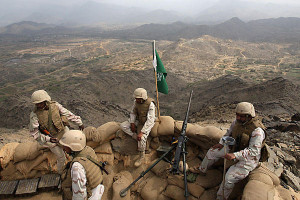
Meanwhile, the Houthis are confidently moving forward, taking control of new territory, including in the south. They now hold all major cities across the country, including the two most crucial seaports – Aden and Hodeidah. This makes a possible sea landing operation extremely challenging for the coalition forces, driving Saudi Arabia, Qatar and other Arab supporters of Abd Rabbuh Mansur Hadi into a tight corner, since they are now unable to create a beachhead which would have allowed them to name a temporary capital with some sort of “legitimate government” in charge. It’s curious that a few days ago Riyadh’s media was busy spreading the rumor that the Saudi military would get the assistance of US Marines in a future beach landing operation. This sounds like a complete hoax since in the present circumstances, US President Barack Obama would never dare send American soldiers to certain death.
But despite all the success that the Houthis have enjoyed on the battlefield, they do not reject the possibility of peaceful negotiations, knowing that sooner or later they will have to engage in a dialogue with foreign actors in order to legitimize their power. Moreover, they’ve even declared their willingness to begin political dialogue within Yemen, but there’s a condition that must be fulfilled – Mansur Hadi will not return as the head of the country. He fled Yemen and brought Saudi forces back with him, this fact makes him a traitor against the entire country in the eyes of the Houthis. The leaders of the Houthis are not prepared to easily forgive the fact that they followed all conditions that he had put forward before the war, while the negotiations were observed by the United Nations Special Adviser on Yemen, Jamal Benomar, yet war against them ensued regardless.
At this stage the best deal Saudi Arabia can possibly get is a cease-fire agreement with the Houthis. Information leaks suggest that the Shia rebels may agree to withdraw their forces from Aden and some southern provinces, where they will be replaced by the regular Yemeni armed forces still loyal to the Houthis. Then it will be possible to resume the national dialogue between all political forces in Yemen that was interrupted by the war, under the watchful eye of the UN Special Adviser on Yemen Jamal Benomar. But first the parties need to choose a place for such negotiations. It is clear that the Houthis would rather hold discussions outside the region, for instance in Moscow, who opposed the aggression against Yemen. Although there’s little doubt that the Saudis and the Americans will insist on some Arab or European capital. In any case, it’s clear that the Shia rebels are going to engage in peace talks only when Saudi Arabia ceases its air strikes. A Houthi official, Saleh al-Samad, stated on April 6 that this group has no other condition for negotiations except for the cessation of aggression.
In addition, the problem of Al Qaeda’s growing influence in Yemen, now strengthened by Saudi bombings, is yet to be addressed. Radical forces were able to capture the large port city of Al Mukalla in the south. They released all sorts of terrorists from local prisons, some of them registered by the US as the most dangerous individuals in the region. Moreover, this town has now been proclaimed the capital of the Islamic State in Arabia.
The only question is would Riyadh be willing to pursue a peaceful settlement of the conflict. The number of air strikes is growing daily though no real damage has been inflicted on the Houthis. Since the launch of the military operation on March 26, more than 500 people have been killed, but the better part of the casualties were civilians. Saudi pilots managed to destroy several warehouses, command posts, a number of Scud missiles launch pads along with several outdated anti-air vehicles and combat aircraft. But this cannot affect the combat capabilities of the Houthis and the military troops that remain loyal to their ally, Ali Abdullah Salih.
This is what makes the new Saudi king Salman bin Abdulaziz Al Saud particularly angry, he thinks of himself as the new leader on a pan-Arab scale, on par with Gamal Abdel Nasser or Saddam Hussein. Meanwhile, the situation in the kingdom is turning from bad to worse. Local tribes are dissatisfied with the war and the decline in revenues from falling oil prices. Therefore, it’s not a coincidence that the Saudis have started bringing prices back up. In the meantime, a case of Shia dissonance against police units has occurred in the Eastern Province of the KSA, leading to serious casualties. Experts are stressing the possibility of mass demonstrations by the Shia population of the KSA, who are willing to show solidarity with the Houthis. The situation remains rather tense in Bahrain as well. But the sparks may fly first on the Saudi-Yemen border, inhabited by Yemeni tribes who have fought Riyadh’s officials before.
So the conflict in Yemen begins to take a new dimension, stretching far beyond its borders. And it is clear that as long as the Houthis are on top while the coalition is basically doing nothing, the Arabs may soon be forced to return to peaceful negotiations in Yemen on the basis of a UN resolutions.
Viktor Titov, Ph.D, is a political commentator on the Middle East, exclusively for the online journal “New Eastern Outlook”.
